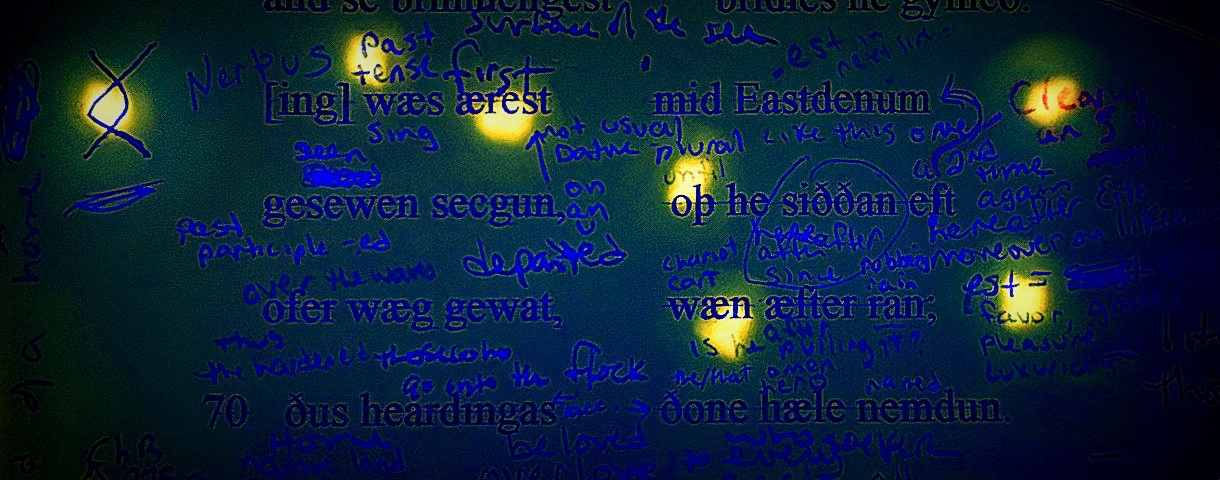 Ing is a mystery. Who is Ing? Where did he go? Why did he leave? We don’t know. You know who knows? The Rune Poem knows: the Rune Poem has the only specific intel we’ve got on Ing.
Ing is a mystery. Who is Ing? Where did he go? Why did he leave? We don’t know. You know who knows? The Rune Poem knows: the Rune Poem has the only specific intel we’ve got on Ing.
Case File: Ing
Clue: Ing was first among the East Danes. Where are these East Danes? The Rune Poem predates the Viking expansion (973-1066), so there’s only one place to look for Danes: modern Denmark and southern Sweden plus the coasts and islands thereabout. The East Danes lived in the Southern Sweden and Zealand half of things, where you can find plenty of people named after Ing: Inge Inga Ingmar Ingrid, living in places like Ingegerd, and Ingeborg. What’s Ing doing in the Old English Rune Poem? His people traveled. Just west of Denmark across the north sea to Northumbria there are also plenty Ings (Inglby Ingoe Ingram Ingham). He’s left a forest of family trees in Britain so let’s climb up them, and look at that! Here’s ing, sitting right at the top. Like other deities of the North and Baltic sea peoples, Ing is the progenitor of many families. Ing was all their daddies.
Clue: Many market towns in Sweden end in köping like Jönköping where a great many of my people came from (I am 1/8 Swedish). Was Ing my daddy too?
Clue: Ing has a wæn following behind him, this is either a cart or a chariot. You ride in a chariot, but you pull a market cart behind, this is likely a market cart. But carts have wheels and Ing went ofer wæg, over the waves. Did he tow the cart behind a boat? Did the cart follow overland on its own after he left? They called the big dipper the wæn, perhaps Ing’s cart is still following after him, even now.
Clue: Besides being the past tense of rinnan, to run, ran means robbery. Did the people take Ing’s stuff after he left? Was that an empty cart running after Ing?
Clue: Ing is old. There are no definite articles (the, a) in the Rune Poem, þone in the Ing stanza is the only place to find a word that might be one, and it is used as a demonstrative pronoun: that (but I say “the” in my translation, we need them in modern English). No definite articles means the Old English here is older than King Alfred (king from 871 to 899) who had a thing for them. The Rune Poem was probably written down in the 600s, but Ing is way older than this, his children go back, way back, to the Ynglingar, (The Swedish royal family) and the Ingui, (the royals of Bernicia in Northumbria): these monarchs are so old they were straight up legends. Ing is also older than the Ingwine people (Ing, Wyn), ruled by King Hrothgar who had that monster problem Beowulf helped out with. And Ing goes back farther still to the coastal dwelling, Denmark occupying, Ingaevones Tacitus felt superior to in the first century. Ing is really really old.
Clue: This is the only Rune Poem stanza written in the past tense. Ing is already gone. Ing left for good. We won’t see Ing again.
Clue: Where did he go? Est. Most people translate this word to East but why didn’t the poem just say East? The stanza says East right there, one line up. The word East was available. Ah but look at this, theres a Baltic tribe called the Este living along the coast of Northern Poland. Where? Just east of the East Danes. What do we know about them? Tacitus says these Este, Aestii he spells it, have a language that resembles the British. You don’t say. Hm. Ing gets around. But what else does est mean? This may not be the first time multiple meanings apply. Lowercase est means favor, pleasure, luxuries, bounty, prosperity. If we take the word as it appears, Ing had the goods and maybe he took them to Poland. The Este did have wealth. Their river, the Vistula, spit much of Europe’s amber right onto their Baltic beaches. Everybody wanted amber. Perhaps Ing took his prosperity to this rich place?
Clue: Ing was nemdun (named) Ing by the heardingas, the hardened people, the hardy ones. Ing was probably pretty tough. You get strong pulling a cartload of prosperity around.
Clue: You can see Ing from here just over the sea. Look at the runes in their alphabetic order: Ing is just east of the people, a sea in between.
Ing, profile: A tough guy from east of here who went even more east. The elder of thousands. Prosperous. Hung around the markets. He was generous with the bounty and no wonder the people who first named him were hardy ones, they didn’t have the luxuries anymore once Ing took them east. But maybe those Este didn’t get prosperity by the cartload either. Ing’s cart might still be in the sky, just look up, you see? There it is still traveling, the big dipper, known in Germanic languages and many others back to ancient times as the wagon. Perhaps this is Ing’s wagon, following after.


